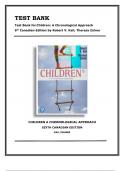Exam (elaborations)
TEST BANK Children A Chronological Approach 6th Canadian Edition Robert V. Kail, Theresa Zolner, 9780135413937 (CHAPTERS 1-16).
- Course
- Institution
TEST BANK Children A Chronological Approach 6th Canadian Edition Robert V. Kail, Theresa Zolner, 9780135413937 (CHAPTERS 1-16). Children A Chronological Approach Sixth Canadian Edition Kail / CHILDREN 6TH EDITION TEST BANK / Children: A Chronological Approach (Canadian Edition). Children: A Chron...
[Show more]



